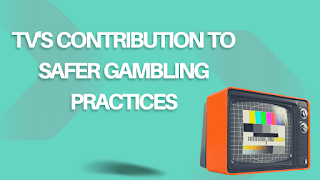TV’s contribution to safer gambling practices
February 28, 2024

Gambling-related disorders and addictions are the primary challenges the casino industry now faces. Multiple measures, including self-exclusion programmes, broad accessibility of helplines for compulsive players, and appropriate therapies, are implemented to cope with the problem. However, informing the audience about the potential risks is no less important than fighting compulsive behaviours.
Leading casino operators and responsible authorities engage in special initiatives, increasing user awareness. Television plays an important role in these promotional campaigns, as it remains one of the most powerful and in-demand media. Let’s explore how TV contributes to responsible gambling in the UK and its impact on the audience.
Responsible Gambling Advertisements
Promoting online casinos on TV is not prohibited, so ads occupy a significant part of broadcasting. However, operators face numerous requirements when promoting their services. All gambling sites operating in the UK must comply with the Gambling Industry Code for Socially Responsible Advertising. However, there are also no GamStop bookmakers as alternatives to UKGC-regulated sportsbooks, who must adhere responsible gambling practices. These regulations aim to safeguard vulnerable individuals and promote a safe and enjoyable gambling environment for all users.
Those promoting casinos should ensure their ads are secure for vulnerable populations and provide fair data. Moreover, the TV commercial must contain a warning about the age limitations (18+ only) and inform of possible risks players take when engaging in the iGaming industry.
In line with socially responsible casino ads, PSAs informing users of safer gaming are launched. Public service announcements are created to increase the audience’s awareness of a particular point and are integrated into TV broadcasts. Television channels often include this information in their broadcasts so that it can reach more individuals. Such an approach is efficient, as viewers tend to show more interest in this problem after watching PSAs.
Educational Programmes and Documentaries
Gambling-themed shows have been at the peak of popularity for years, and demand for them doesn’t fall in 2024. While casino movies mostly demonstrate the allure of this entertainment, documentaries are about real-life experiences. Multiple movies based on real events are broadcasted on TV: for instance, “Understanding Joy” has become one of the best representatives of this genre. The story of a gambling-addicted lady demonstrates all the downsides of this seemingly fun entertainment and makes viewers reconsider their gaming behaviours.
Raising the culture of responsible gambling requires integrating all the available measures, and implementing special educational programmes is another efficient tool. Television programmes can promote safer casino experiences by engaging experts, informing viewers about potential harm, and exhausting treatment in case of disorders. Knowing these details helps users develop healthier gambling behaviours and control themselves when spinning the reels in bright slots or joining the poker table.
Viewer Engagement and Feedback Mechanisms
Promoting responsible gaming initiatives is critical, but how to engage viewers to explore the topic? Many would switch the channel and search for something other than casino commercials about safer behaviours. Those creating TV ads utilise all their skills and knowledge to attract more users to the promotional campaign and increase awareness about the problem. Information on support groups and treatment centres is often included in gaming-related television programmes.
Getting feedback to improve the available content and receive recommendations on further advancements is also essential for gambling TV commercials. Therefore, the availability of hotlines or other means to leave the response is implemented by numerous channels. Viewers can leave their fair opinions, while everyone engaged in advertising can conclude whether the message was efficient.
Collaboration with Regulatory Authorities and Industry Stakeholders
The UK Gambling Commission, as the main body regulating the sector, collaborates with numerous companies and institutions to ensure a fairer and more transparent industry landscape. Therefore, it often launches special campaigns in partnerships with betting and gaming operators or other stakeholders. Such an approach allows to engage more viewers: for instance, lovers of a particular casino brand are always happy to explore what it has recently developed.
Collaborations with leading gambling operators are really beneficial in this case, as they have already gained recognition in the industry. In this case, TV ads and programmes can target broader audiences and deliver messages to more people. UKGC is known for the strictest regulations globally, so every market player must stick to the authority’s requirements. In this case, gambling-related TV programmes bring maximum benefits to viewers and help significantly decrease the number of affected individuals in the UK and beyond.
Final Thoughts
According to reports, approximately 76 per cent of gambling ads are on television, so it’s a powerful medium to promote this risky entertainment. Millions of users tend to show increased interest in the activity after seeing it on TV. Therefore, the casino and betting industry heavily invests in safer gaming campaigns to encourage users to reconsider their behaviours and stick to the responsible approach. Regulatory bodies, operators, and other stakeholders collaborate with the common aim of preventing underage gambling and minimising the number of people negatively affected by casinos and sportsbooks.
